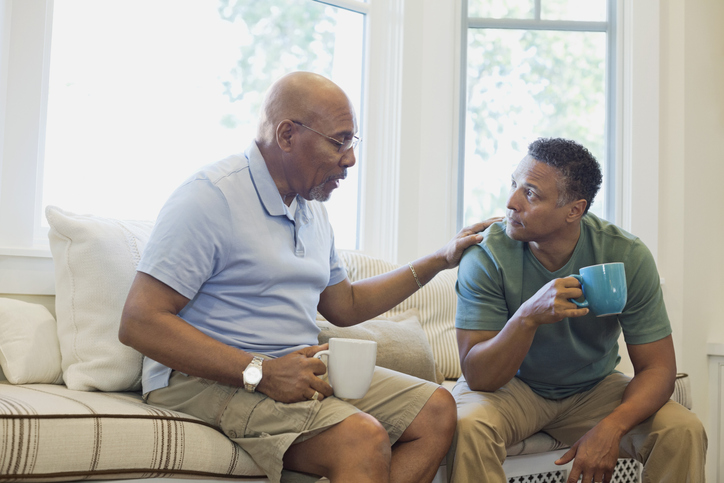November is a time to stand up for men’s health and join the Movember movement. Grow a Mo, get sponsored to get moving for mental health, host an event or “Mo your own way”, as the organisers put it! It’s a month-long focus on men’s physical and mental health, where moustaches lead the conversation.
When you look at the health statistics, it’s not hard to see why the Movember founders believed that action on men’s health was essential:
- 1 in 6 UK males will be diagnosed with prostate cancer in their lifetime.
- More than 6 new cases of testicular cancer are diagnosed every day in the UK. Most of these are in young men.
- Men will die on average 4.5 years earlier than women, and for reasons that are largely preventable.
- Men are far more likely than women to go missing, sleep rough, become dependent on alcohol and use drugs frequently.
- Men are less likely to access psychological therapies than women.
- In the UK, just over three out of four suicides are by men and suicide is the biggest cause of death for men under 35.
- Across the world, one man dies by suicide every minute of every day on average.
Men’s health is in crisis. And Movember is a time for you to help break the silence and taboos around that, and help create change.

Men and mental health
Men are just as likely as anyone to struggle with their mental health, but less likely to get the help they need. Various studies have shown that social ideas about masculinity often get in the way of men accessing support. Toxic masculinity rejects things like talking about your problems, displaying emotions, crying, appearing ‘weak’ or needing support.
Fortunately, you can play your part in challenging the stigmas around men seeking help for their mental health. If you’re concerned about a man in your life, check in with him and listen openly, using the Movember ALEC model - it might just save his life.
How to start a conversation, using the Movember ALEC model:
A - ASK
Ask how he’s feeling. Mention any changes you’ve picked up on: has he stopped replying to texts or coming to social events?
Say something like, "You haven’t seemed yourself lately – are you feeling OK?”
L - LISTEN
Give him your full attention. Let him know you hear what he’s saying and you’re not judging. Don’t offer solutions - just listen.
Ask a question like: "That can't be easy – how long have you felt this way?"
E - ENCOURAGE ACTION
Help him focus on simple things that might improve how he feels. This might include sleep, exercise, nutrition or seeing supportive friends. Check whether anything has worked in the past.
Suggest that he shares how he’s feeling with others he trusts. And if he’s felt low for more than two weeks, suggest he chats to his doctor.
C - CHECK IN
Follow up your conversation. This helps to show that you care; plus, you’ll get a feel for whether he’s feeling any better.
The world loses a man to suicide every minute of every day. Improving overall mental health and helping men build stronger social connections can reduce the risk of suicide.

Mental health support
If you have concerns that someone’s life is in immediate danger, call 999.
For non-emergency support, call NHS 111 or the Samaritans on 116 123.
Men’s physical health
Men don’t just access mental health support in lower numbers. It’s true for physical health concerns too.
Men go to the GP 20% less over their lifetime than women (even after you’ve taken account of pregnancy-related visits). Young men in particular visit the GP half as much as their female peers.
Movember focuses its campaign on the two biggest health challenges for men: testicular and prostate cancer. For both conditions, the earlier you can detect and seek treatment, the better your outcomes are likely to be. The problem is, social ideas about masculinity are holding men back from checking themselves for symptoms, going to their doctor early and following up on medical advice.
For both testicular and prostate cancer, it’s important you:
- Check your risk profile - age, family history, race/ancestry, medical history and lifestyle factors (such as alcohol and smoking)
- Know what to look out for - check the symptoms for testicular and prostate cancer
- Focus on a healthy lifestyle, including a balanced diet and regular exercise
- See your GP as early as possible if you have symptoms or are higher risk
- Follow your GP’s advice and any medical guidance you’re given
- Talk about these conditions and help break the silence among your male friends and relatives
How Essex Wellbeing Service can help
Your lifestyle can have a huge impact on both your physical and mental health. We can support you with stopping smoking, reducing your alcohol intake, improving your sleep, managing your weight or increasing your physical activity. We also help reduce social isolation and provide mental health support.
Get in touch to see which of our services could support you best. By working together, we can take action to help all men live healthier, happier and longer lives.


